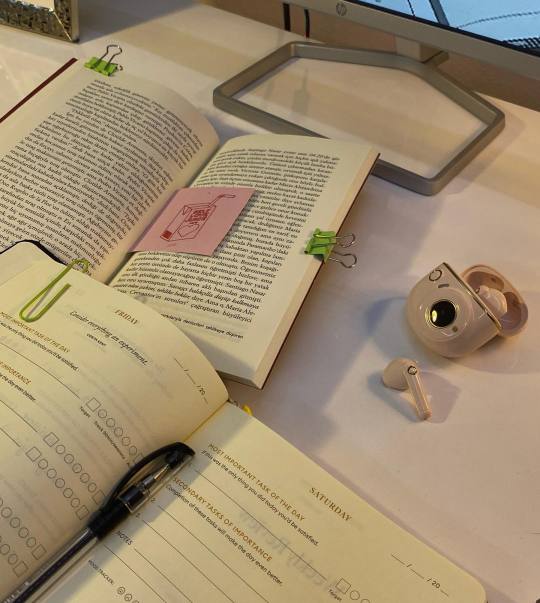Don't wanna be here? Send us removal request.
Text
Priming myself for work
After watching some of Elizabeth Filips' YouTube content, I realised that I, like her, am very passion-driven, and tend to focus super intently once I'm interested in something.
In one of her videos, she discussed "dopamine priming" as a way she gets herself very interested in a topic, in order to motivate herself to study it.
I apply a slightly more generalised, broad version of this - allowing myself a few minutes (set a timer, don't let yourself get sucked into mindless scrolling for hours!) to scroll through aesthetic and cosy study content here and on other platforms; I pick out a nice lofi playlist, and get myself comfy.
As long as this set-up routine is contained and uses a finite amount of time (again, set that alarm!), I find it really helps to get me in the right mindset to do work happily, even when I'm dreading a pile of administrative tasks, and really don't want to be working.
Be kind to yourself when you're feeling unproductive; take frequent, actually restful breaks (don't use breaks to check email, actually rest your brain); don't push yourself to do more than four hours of focused, concentrated work.
12 notes
·
View notes
Text




Happy Monday 💛with cozy vibe✨
source: sinoistudie
661 notes
·
View notes
Text
Work, productivity, and self-care
After a month's sick leave, I'm back to work this week. I'm being thrown straight back in to the final lap of my PhD: this is crunch time, when me at my most perfectionist and unhealthy could absolutely run myself into the ground with over-work. Equally, this is when me at my most avoidant and unhealthy could hide under my duvet, panic and procrastinate, and miss very important deadlines.
So. How do you successfully juggle the required challenging work that needs to get done, and minding yourself? My plan is a work in progress, changing constantly, but this is my current blueprint:
Having a cosy morning routine that works for me, and is flexible. Some mornings I go to the gym, some days I work from home, and some I need to be in the office, so my morning routine needs to be adaptable or it won't stick. I have a list of four things, including movement (whether that's a quick little dance party with my headphones on or a yoga-in-bed session), meditation, reading (a nice calming book, and often with my morning coffee), and checking in with myself (whether that's just sitting and seeing how I feel, journalling a bit, or writing down a few to-dos that are clouding my brain). I try to do two of these each morning, picked from the list depending on the day.
My two to-do lists (courtesy of Struthless on YouTube): one "bare minimum" list that has some really necessary I-won't-eat-dinner-if-I-don't-buy-food type items, and one "ideal" list which has other items on it, that if I'm feeling good and motivated, I can tackle. Because I've been off work, these two lists have so far been home and care tasks, like doing my laundry, cooking meals, paying bills etc., but I'm going to try to adapt this to suit work as well... maybe by creating an equivalent two lists for work tasks, to help me avoid overwhelm.
Living by my bible "How to keep house while drowning" by KC Davis. This gentle, loving hug of a book is the principle by which I'm guiding my days. Keeping my space healthy and clean is one of the key things that helps me stay grounded and not topple over the cliff of overwhelm. I highly, highly recommend picking it up if you like the sound of its blurb - it does exactly what it says on the tin.
Taking productivity literature, absorbing the bits that seem useful, scanning it through a lens of toxic-productivity-culture-recognition, and evaluating whether I can implement it in a healthy, useful way that doesn't trigger my susceptibility to chronic overwork and ableist perfectionism. I recently read Four Thousand Weeks by Oliver Burkeman and was floored by how consistently I felt completely seen by many of his anecdotes. I essentially am trying to take the mindset of Laziness Does Not Exist by Dr Devon Price (again, so well worth a read) and applying the lessons and lens of that book to techniques like those presented in books like Hyperfocus by Chris Bailey, and picking and choosing what parts serve me.
Of course, my classic procrastination trick of wanting to deeply research a whole pile of different organisation techniques is desperately pulling me to reevaluate whether I should continue using my Hobonichi-inspired Filofax print-outs, or whether I should switch to another system (that I have previously used and subsequently abandoned), like Trello Boards, Notion, Obsidian, etc...
I'm sure once I actually start back to work, my ideas and plans will change, and in practise I will find other techniques or tools that serve me better.
1 note
·
View note
Text
Original posts on study/journaling tips and more!
This is a masterlist with all my original posts linked to study tips, journaling, reading, and more. I will keep it updated in time, and I also included links to a few useful asks I have receved. I hope any of these might be helpful.
Study organization tips
What I do with bullet journal spreads I end up not using
Bullet journal weekly spreads ideas
5 simple daily habits that changed my life
music for studying reading and writing
Items I bought for university: worth it or not?
Tips on how to study history by an history student
How to read more
History exams tips by an history student
My writing journal
(Ask) how I annotate
(Ask) how I read non fiction books quickly
(Ask) how to remember names when studying history
Thesis writing tips from someone who is currently writing their thesis
My thesis notebook
(Ask) my process for writing a chapter of my thesis
(Ask) how I organize my bullet journal
(Ask) univeristy spreads in my bullet journal
(Ask) tips on reading and writing scientific articles
More thesis writing tips from someone who just finished writing their thesis
(Ask) on procrastination and planning tips for post gradute studying
(Ask) how I study
(Ask) tips on how to write the introduction of a research
(Ask) journaling tips
My reading routine
(Ask) tips on how to get out of a reading slump
10 books to get you out of a reading slump
(Ask) gift ideas for people who love journaling
820 notes
·
View notes
Text
Ever wanted to print and bind your own customized bullet journal, but then inevitably discovered that finding or making a suitable dot grid pdf file is weirdly hard? Like, maybe you find one, but it's never the right scale, it looks crappy, you can't edit it, it includes some junk you don't want... and then you go to try and make your own and it's like, ok get a png of one page of dots and copy-paste it into a document 200 times - what! nightmare! I'm not doing that! ...uhhhhh, not that I have any personal bullet journal typesetting related trauma or anything. haha.
But I mean, it's just dots, right? you should be able to go, ok I want 200 pages of dots 5mm apart on half-letter sized pages, make it so. Why is that so hard?
Well, now it's easy!
Click the link, follow the instructions, get your journal, print that sucker out and bind it using your preferred method. I promise it's that easy. Please don't be daunted by the command-line stuff - you do NOT need any coding experience to use this template (although if you can figure out a bit of html and css, you'll be able to do even more customization than what I've already built in).
Also, I've dedicated this code to the public domain, so you are free to do just about anything with it including modify, redistribute with or without credit, use for commercial purposes, etc etc. But, if you like it, feel free to tell me how cool and pretty I am in the notes. ⤵
752 notes
·
View notes